Leaf Hound- Growers of Mushroom; Famous Obscurity; Interview with Peter French
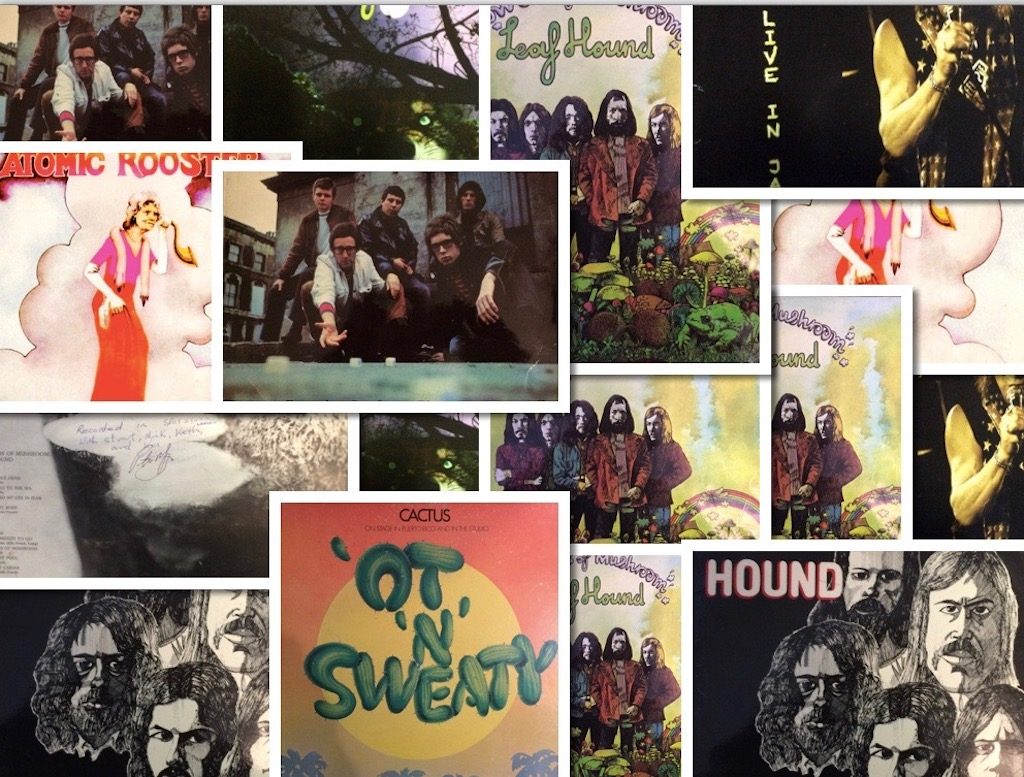
Some albums develop a mythology based on rarity, the relative lack of commercial impact at the time of release and later recognition as an influence to other, more well known records by other bands. Leaf Hound’s “Growers of Mushroom” is one such album. It’s a famously “obscure” album, with original copies easily fetching well over $3,000 US. Apart from its desirability as a collectible, it’s actually a great hard rock album, its members drawn from Black Cat Bones, whose “Barbed Wire Sandwich” was covered here recently as another important “precursor” album.
We’re fortunate to have Peter French with us (literally and figuratively), to tell us a little about the making of the album and where it fit in that fascinating journey from the electric blues revival taking place in the UK in the mid-to- late ‘60s to the harder blues based rock toward the end of the decade that created a template for generations to follow. That sound has been rebooted in various forms over the years with mixed success, from bands like Wolfmother to the latest sensation at the time of this writing, Greta Van Fleet.
TVP: You stepped into Black Cat Bones after the release of Barbed Wire Sandwich. What was the state of the band and where was it going musically at that time? What role did you play in shaping what would become Leaf Hound and its Growers of Mushroom? You are credited with writing a number of the songs appearing on the album….
Peter French (PF):Black Cat Bones were an excellent legendary blues band, with great musicians, it originally had Paul Kossoff on lead guitar before he left to form Free with Paul Rogers, I was asked to join Black Cat Bones when it had Rod Price on guitar, however it was some time later ––when Rod Price decided to leave the band to join the American band Foghat ––that I got my guitarist and cousin Mick Halls to join Black Cat Bones. We were touring and playing all the basic blues tunes, but after some time I felt it had all started to get a bit boring and stale, so both my cousin and I decided to write some new powerful up -beat “classic rock” compositions, to inject some fire into the band’s musical direction; we now had a new excellent rock style drummer join the band named Keith Young.
I decided it was now time to change the band’s name and image, I chose the name Leaf Hound from a title of a classic horror story written by Ray Bradbury titled “The Emissary,” and the band Leaf Hound was formed.
TVP: What was your background before joining this band?
I had previously quite a few semi pro bands, together with my cousin Mick Halls, bands called, The Switch, The Erotic Eels, and Joe Poe.
It was when we were looking for a new bass player for our band that we auditioned ex-Fleetwood Mac’s bassist Bob Brunning; at the time it turned out that he had a record company called Saga Records that was interested in Bob getting a band together. Bob liked my vocals and Mick’s guitar and asked us to drop our band and to work with him instead. Mick and I decided to give it a whirl and It was to be my first ever recording with The Brunning Sunflower Blues Band’s album, called Bullen St. Blues. This was released in 1968.
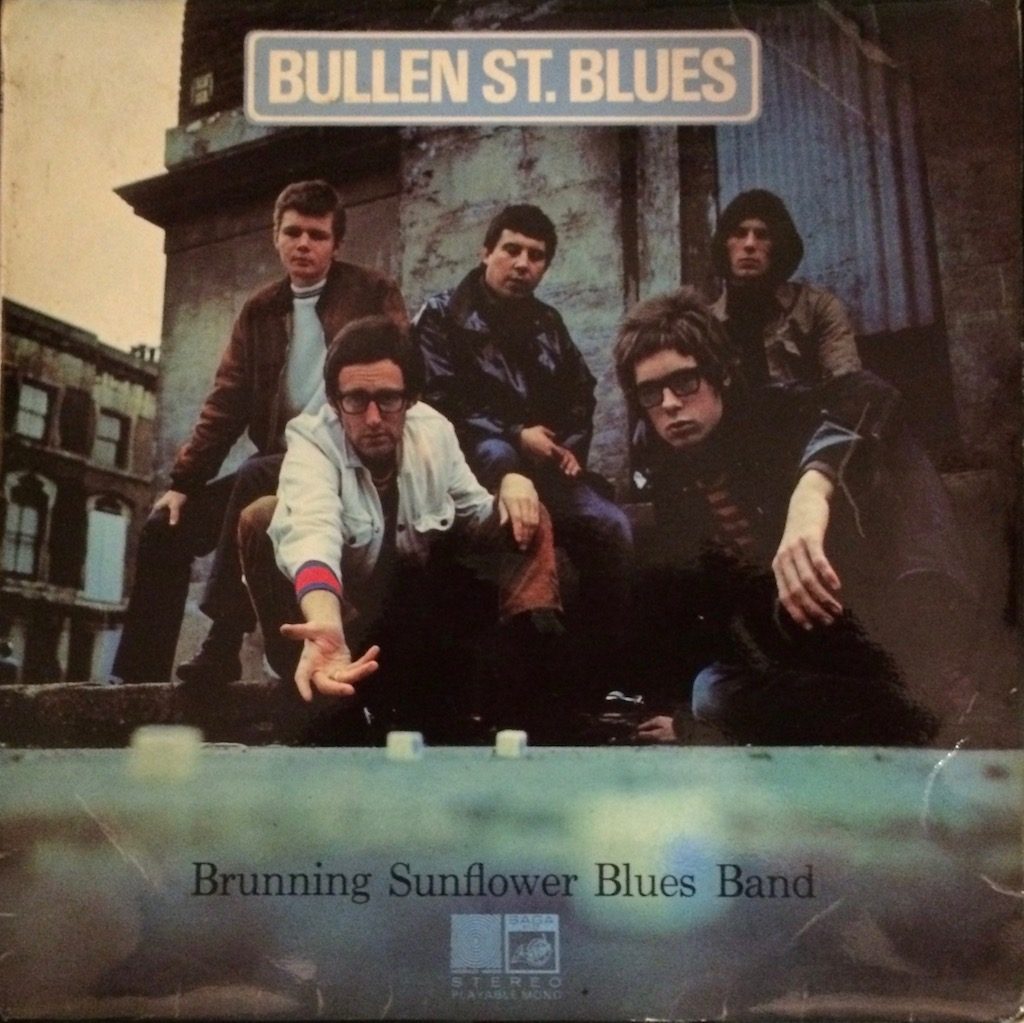
TVP: How soon between forming (or reforming) the band as Leaf Hound until you recorded Growers of Mushroom? Did you work the clubs or spend a lot of time rehearsing before you went into the studio?
PF: No not really, the band was hoping for something to happen, we rehearsed ideas in the drummer’s front room, and I guess I spent quite a bit of time writing with my cousin Mick hoping that people would like the new song ideas we had put together, and wondering if we ever were going to get a chance to record them.
It was a frustrating time as nothing much was happening gig wise, but the band was enjoying the chemistry of jamming together.
We were invited to do a showcase with a bunch of other bands in London. After we did a great show and received a swell reception, we were approached by an agency called Lynton Maitland, who we were to find out rather unfortunately and unknowingly and much later to our cost, “after signing a contract with them” that they were nothing more than a couple of dodgy creeps.
It was at this show that I managed to slip off the stage, breaking my collarbone (and jumping back on stage to finish the set only to be carried off by an ambulance), that I appreciated the cost of “the show must go on.”

The upside of this of course was it helped bring about the recording of the now classic legendary Decca edition of Leaf Hound “Growers of Mushroom” album, which I am informed is now one of rock’s most collectable albums.
TVP: What can you tell us about the recording sessions?
Leaf Hound literally were on fire the day we went into the studio, we all really wanted it to happen and we went at it like men possessed, we found out that we were going to be short of one song during the recording so my cousin and I quickly composed together the composition “Sawdust Caesar.”
The whole album with the new composition was recorded in one marathon eleven-hour session, it was after the recording that Mick explained to me “We don’t really need the rhythm guitarist Derek Brooks anymore in the band– I can do all that myself.”
We didn’t have a keyboard player so Mick decided to try his hand at piano and play the fills on the keyboards himself.
TVP:Do you know if the master tapes still exist?
PF: I originally did have a copy somewhere but I have no idea where they are now.
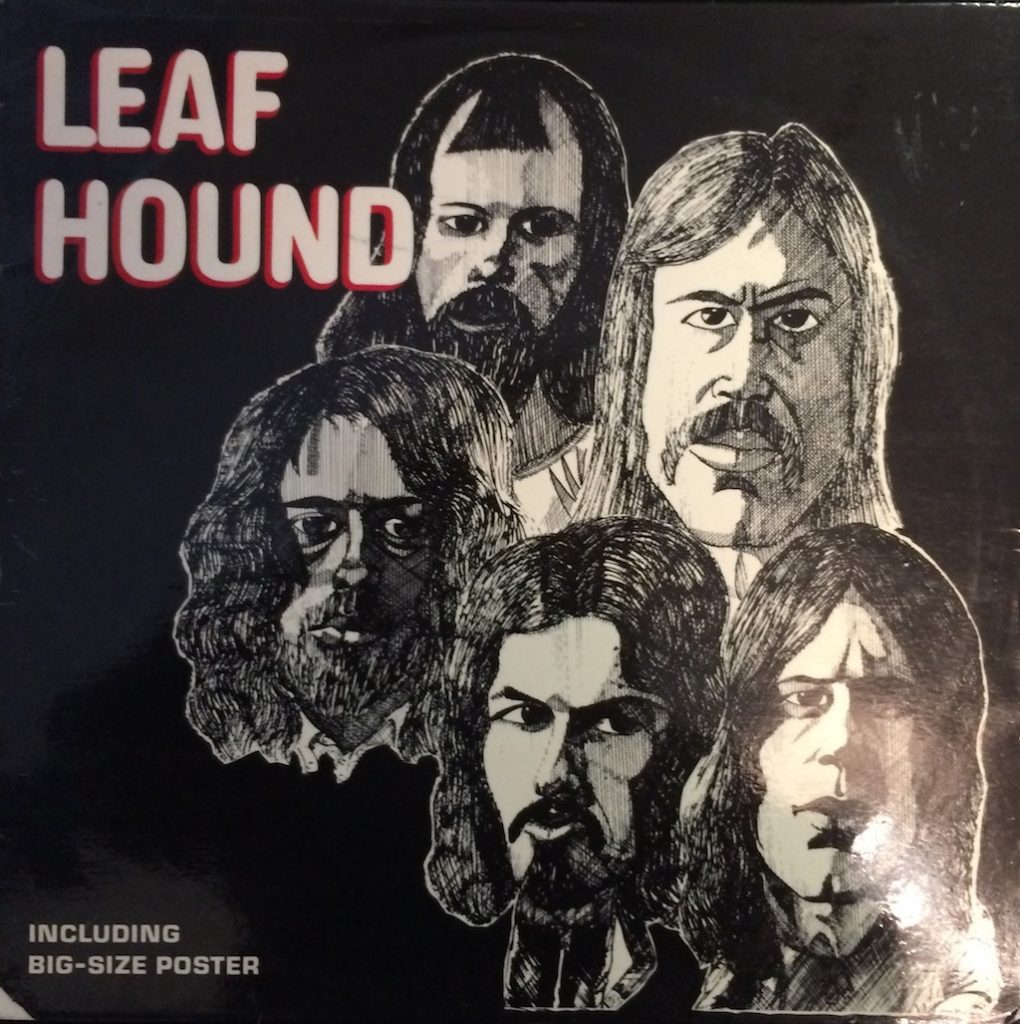
TVP: The album was actually first released by Telefunken in Germany as a self-titled album without the title track. How did that come about?
PF:No idea, but I guess this must have been arranged by our dodgy agents….
TVP:Were you touring heavily in Germany at the time?
PF: No, the band was only ever to do one short tour of roughly about eight days in Germany; we did actually blow all the other acts we played with at the time off the stage, and we were completely knocked out with the reception we received.
Sadly, this was to be the only tour that the early Leaf Hound band ever did before its demise.
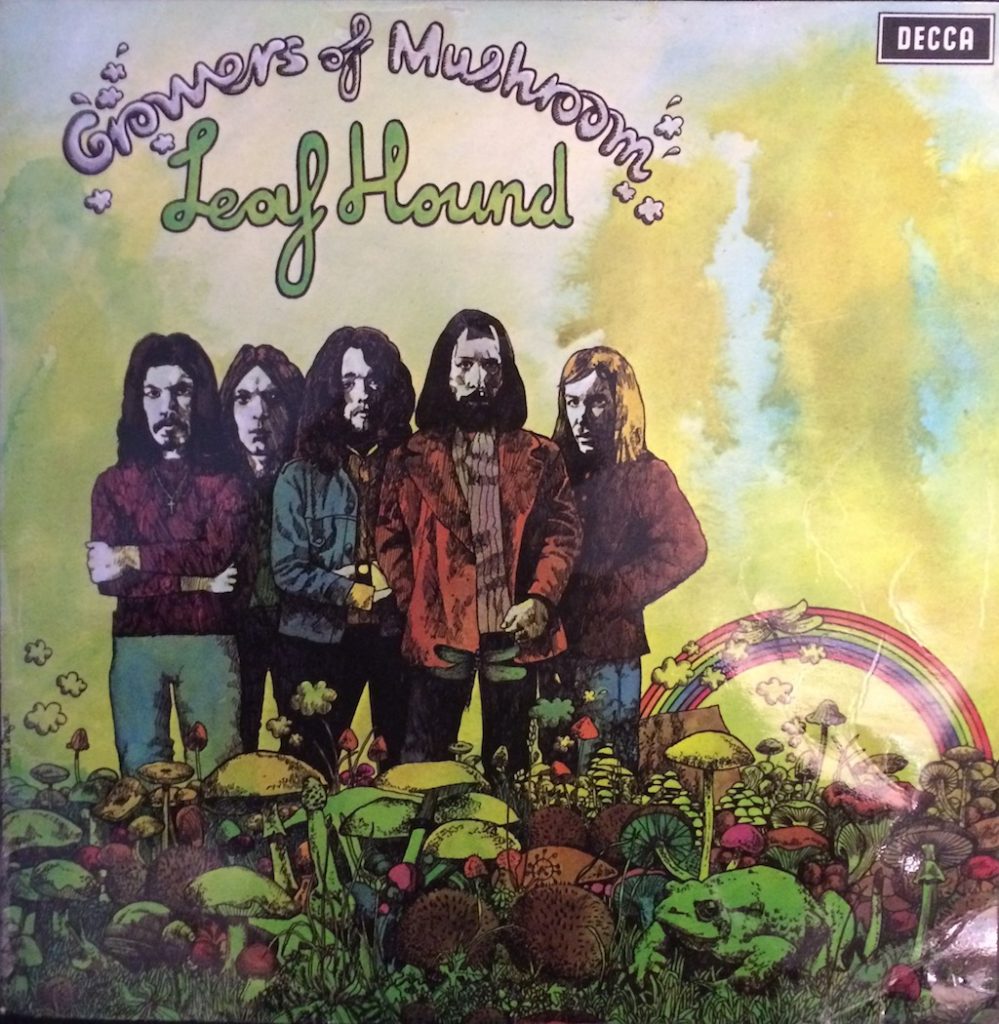
TVP: By the time the album was released as Growers of Mushroom in the UK, the band had already broken up. What happened?
PF: After doing our brief but successful tour in Germany, Lynton Maitland Agency informed us that the album we had recorded with Decca records was now no longer going to be released. To say the band was crushed on hearing this would be anunderstatement, it was to be the death knell of the band.
I was later to find out to my amazement long after the band had actually broken up that the album, Growers of Mushroom did eventually get released.
I also found out much later that Decca apparently had no information at all about the band–– they thought we were an American outfit; the artwork itself for the cover of the album was in itself a brilliant piece of work done by a now famous artist. But it mistakenly portrayed the band as being a bunch of hippie druggies after the artist only had only been given the title ‘Growers of Mushroom’ to work by.
TVP: Do you have any idea how many copies of Growers were pressed by Decca in the UK?
PF: I don’t honestly know exactly but a best guess I thought there was around 2000 copies pressed.
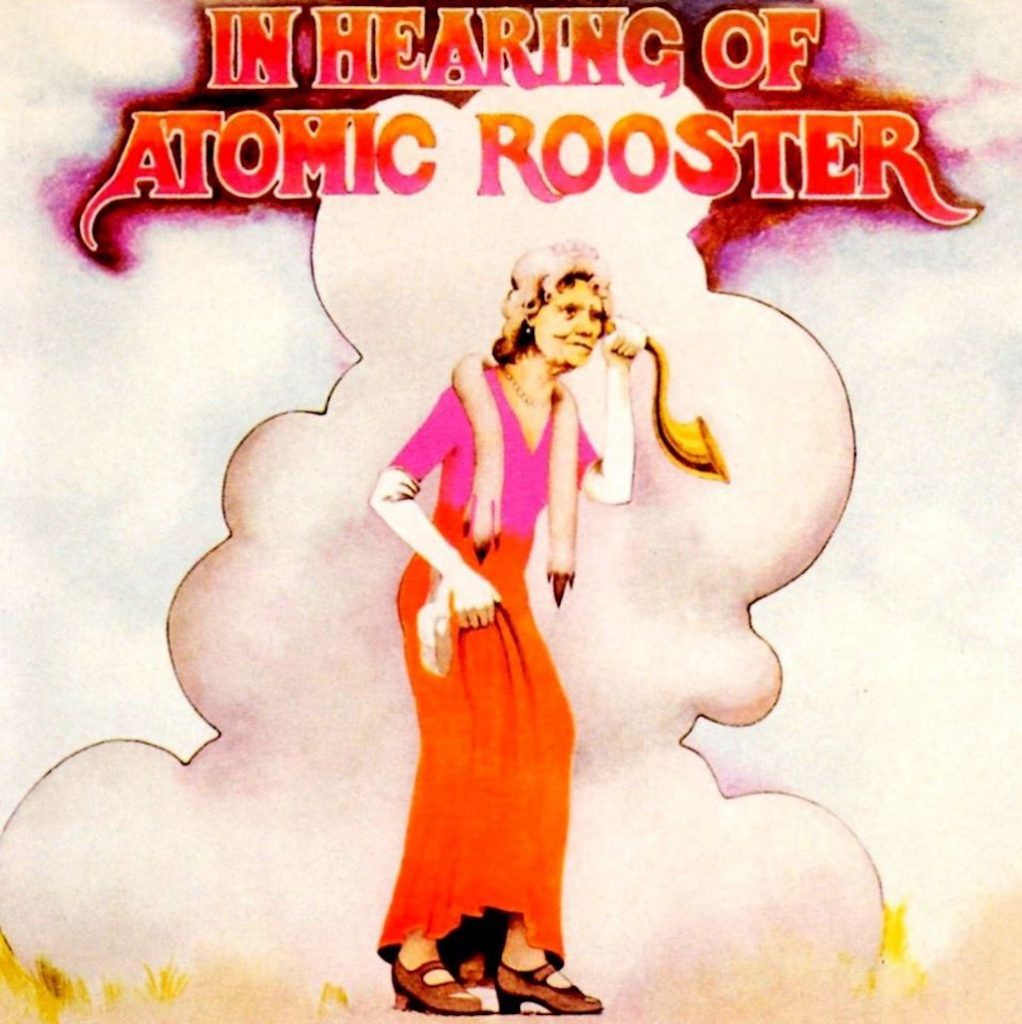
TVP: You moved on to Atomic Rooster, for their release of In Hearing of. What was it like to work with Vincent Crane? His keyboard work on the previous album, “Death Walks Behind You” is virtuoso level stuff.
PF: Vincent had somehow heard my vocals on the Leaf Hound recording, an album which he told me he thoroughly loved, and then Vincent introduced me to John Cann who also liked the vocals on Leaf Hound, they both asked me to join the Rooster, I was delighted, I really liked Vincent’s playing and also Johns guitar work.
I had the pleasure to record with them their most successful album, Atomic Rooster’s “In Hearing Of.”

I was sad to hear after we had finished doing the recording that Vincent and John had a massive falling out, this was over the mixing of the finished tracks an unfortunate ego clash between them had broken out; John asked me to leave Vincent and form a new band with him and Paul Hammond, but Vincent asked me to stay. I decided to stay with Vincent and sort the finished album out, I was very disappointed that John Cann had left with Paul Hammond, but consequently Vincent then employed two new members Ric Parnell and Steve Bolton to join with Rooster to tour and help promote the finished album and to do the tours of Europe, America, and Canada.
TVP: You also worked with Cactus, a well-loved band that was more straight ahead rock than hard electric blues. What was that like for you? Were you touring in the States at the time you recorded their fourth album, ‘Ot’ ‘N’ Sweaty?
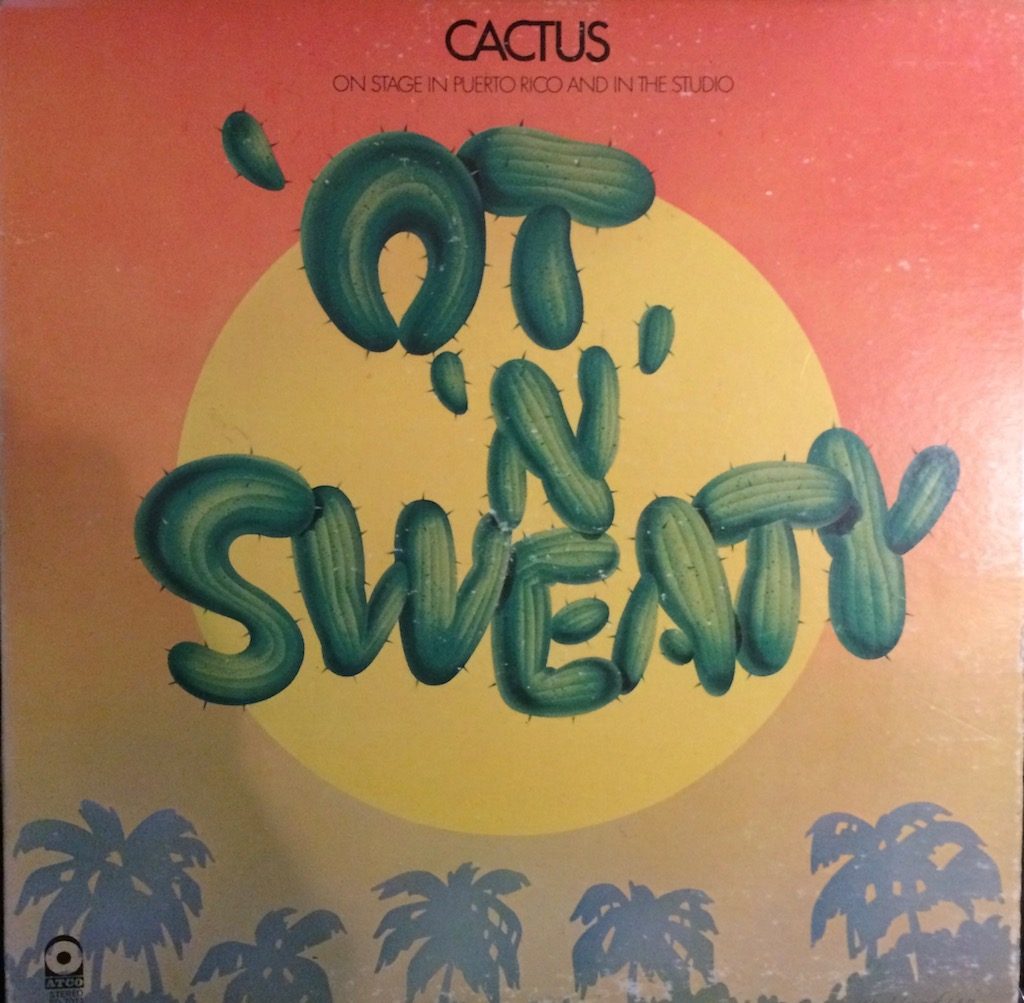
PF:It was while I was on a successful tour in the States with Atomic Rooster that we were to do a few shows together with a rock band called Cactus, it was during this tour that Carmine Appice and Tim Bogert from Cactus approached me said that they really liked my vocals and asked me if I would consider leaving Rooster and join their band.
I gave some thought to this proposition of having to think about quitting Atomic Rooster who had just had an album I featured on “In Hearing Of” at No. 16 in the “album charts” and the complication of moving my then wife and my young four-year-old son to the States. It was a difficult gamble to take, but at this time it had become more and more apparent to me that Vincent had seemed to become closed and paranoid about anyone co-writing with him on any new material, probably due to the regrettable break up with his former guitarist co writer John Cann.
I was also being kept on a pathetically poor wage.
It was at this time that I had the Cactus Management in New York on the phone assuring me everything will be taken care of and that the boys really wanted me to join Cactus, I thought it was a gamble worth taking as I knew I would be able to contribute with the writing for Cactus on their new proposed album.
And I was truthfully knocked out with America and the American audience’s reaction to classic rock music.
So after I had returned to England I did one last concert with Rooster at the Goodbye Summer festival with the Faces, The Who, etc. to an audience of some 60,000 people.
It was after this show that I told Vincent that I had had enough and was going to leave Rooster to join Cactus.
The Cactus I joined were red hot, they had a new ace guitarist called Werner Fritzschings and a new great keyboard player Duane Hitchings, we recorded the fabulous ‘OT, N SWEATY” Album at Jimi Hendrix’s studio in New York, and on the other side it features a red hot live set recorded from the Mar Y Sol festival in Puerto Rico.
I was delighted to see this album receive rave reviews right across the States in Billboard, Record World, with FM airplay, etc.
I was over the moon with the band’s current success, and we were really knocking em` dead on our U.S. tours, and now we had a new West Coast tour being planned.
Everything was looking great, then to my complete surprise and amazement, right out of the blue I got a message from the management that Carmine and Tim have dropped Cactus to join Jeff Beck.
What the? To say it was a bombshell would be an understatement.
Their management said but you can form a new Cactus with us, to be honest I was pretty pissed off.
I was invited by their management’s attorney Steve Weiss to join him to go and see their first ever gig with Jeff Beck being held at the Bronx; it was a disaster: they were late, and when they performed they got booed and stoned off the stage, it was a poor comfort to hear the crowd calling out “where’s Cactus?”
I later read an article that Carmine was previously warned by Rod Stewart “don’t break up this great band” but that’s history.
(Fact) Atlantic Records years later released “OT N SWEATY” again on a CD, quoting it to be “One of their top 50 best ever recordings.”
At the time I thought that there was no way that I could have successfully expected American audiences to accept another Cactus without Cactus’s rhythm section in it.
So I was left with no alternative now but to return with my tail between my legs to head back home to England.
I was later asked to write lyrics to a couple of compositions for the newly formed Beck Bogart & Appice, which I did. I wrote the lyrics to “Lady” and “Lose Myself with You” for the new B.B.A. album.
TVP: You seemed to be constantly busy–– Randy Pie in Germany, you also worked on an anti-war rock opera.
PF: The break up with Cactus caused problem after problem, when Robert Stigwood’s manager Roger Forrester approached me upon my return offering to finance and form a new band with Jimmy McCulloch the guitarist from Blue and later Wings, I of course was delighted, so me and Jimmy got a band together and all was going well. We wrote four new compositions together, but then Stigwood found out that I was now being held to my American contract with Cactus even though the band was no more in existence, I was screwed and found that I couldn’t record for the next three years–until that five year contract had expired.
It was only when that contract had actually expired that Chappell music publishers Mike Batory approached me and said –there’s a pretty good European band called Randy Pie auditioning in London why don’t you audition for them?– I got the audition and consequently went to live in Hamburg. I was to record the Randy Pie “Fast Forward” album with them in One Step Up Studios in Los Angeles.
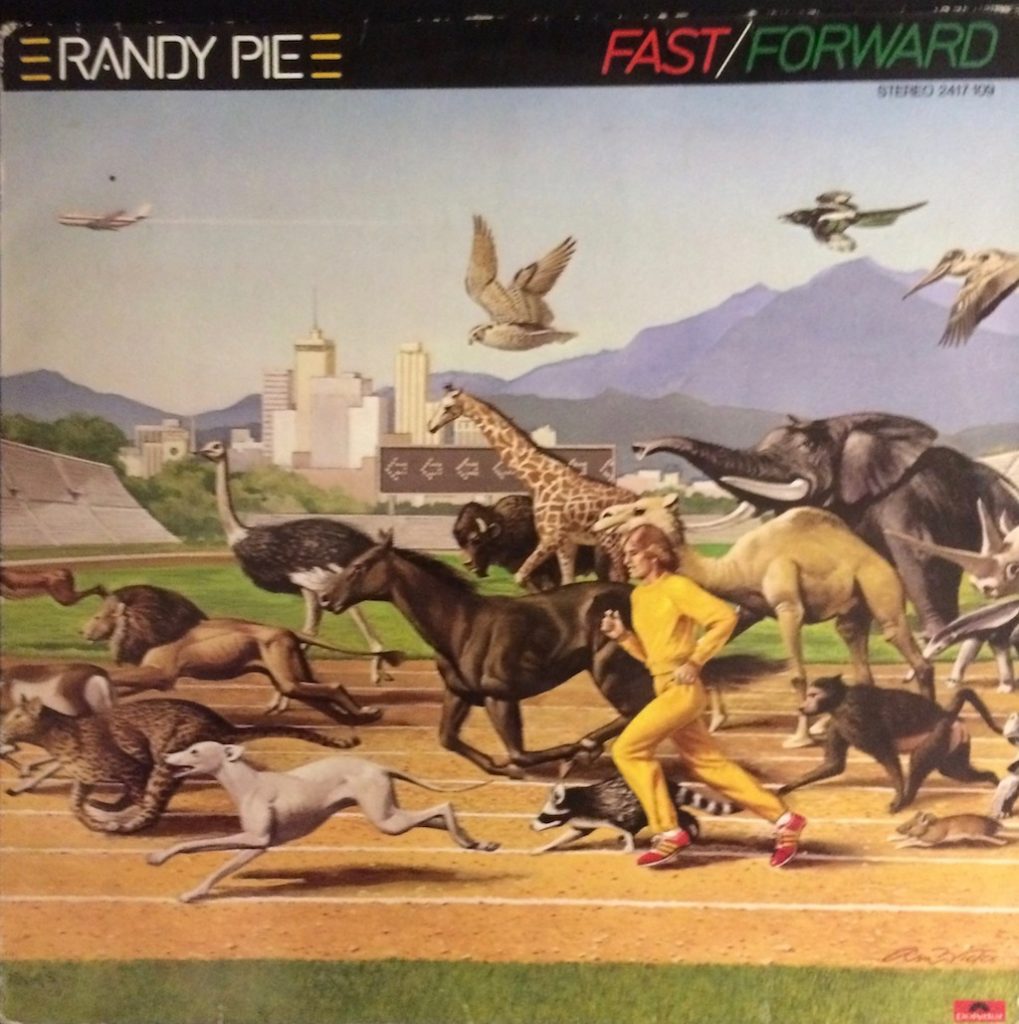
It was while I was living in Germany that I was approached by a German producer Walter Quintus who said that Harvest Records were doing an “Anti War” Rock Opera double album, titled “Der Fuhrer” and asked if I would consider doing a vocal session on it. At first I thought, is this for real? But, then I saw the script, which I thought, was very brave of the Germans to try to get it to be released.
I was then told that the part they wanted me to do was originally offered to David Bowie but he was busy doing his album ‘Heroes Helden” in Berlin.
I saw that artists like the respected British West end performer Marti Webb, and popular German blues rock singer Inga Rumpf, had also put their names to it, well I thought why not, so It was that I recorded the part of Joseph Goebbels.
However, it was greeted with controversy, the cover artwork of the album was totally wrong —it had a profile of Adolf Hitler —which gave the wrong impression of what it was all about; they say “you can’t judge a book by its cover” in this case they unfortunately did, and so it gradually disappeared.
TVP:You had various stints with other bands over the years. When did you realize that there was a buzz about Leaf Hound and is that what led to its reformation?
PF:To be quite honest with you I never quite understood how come Leaf Hound weren’t a great success, every recording we did had always received fabulous reviews, I have always believed in the band and always wanted to keep the spirit of the band alive, and now some fifty years later my band Leaf Hound are still gigging, Leaf Hound are actually starting to be popular again.
TVP: Tell us a little about the newer Leaf Hound albums….
PF: There have been three Leaf Hound Albums /CDs, released on Repertoire Records:
The classic Leaf Hound
*Growers of Mushroom Album
*Leaf Hound “Unleashed”
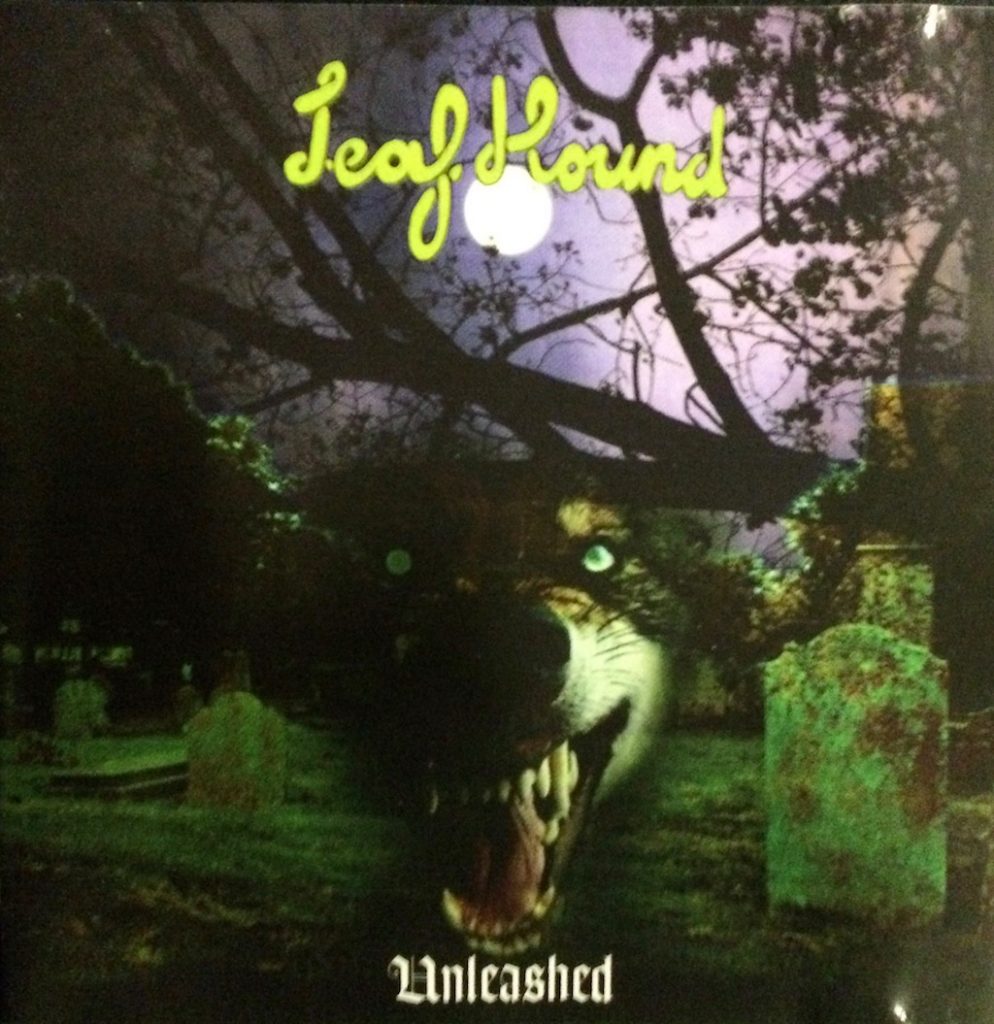
*Leaf Hound “Live in Japan” (March 2019)
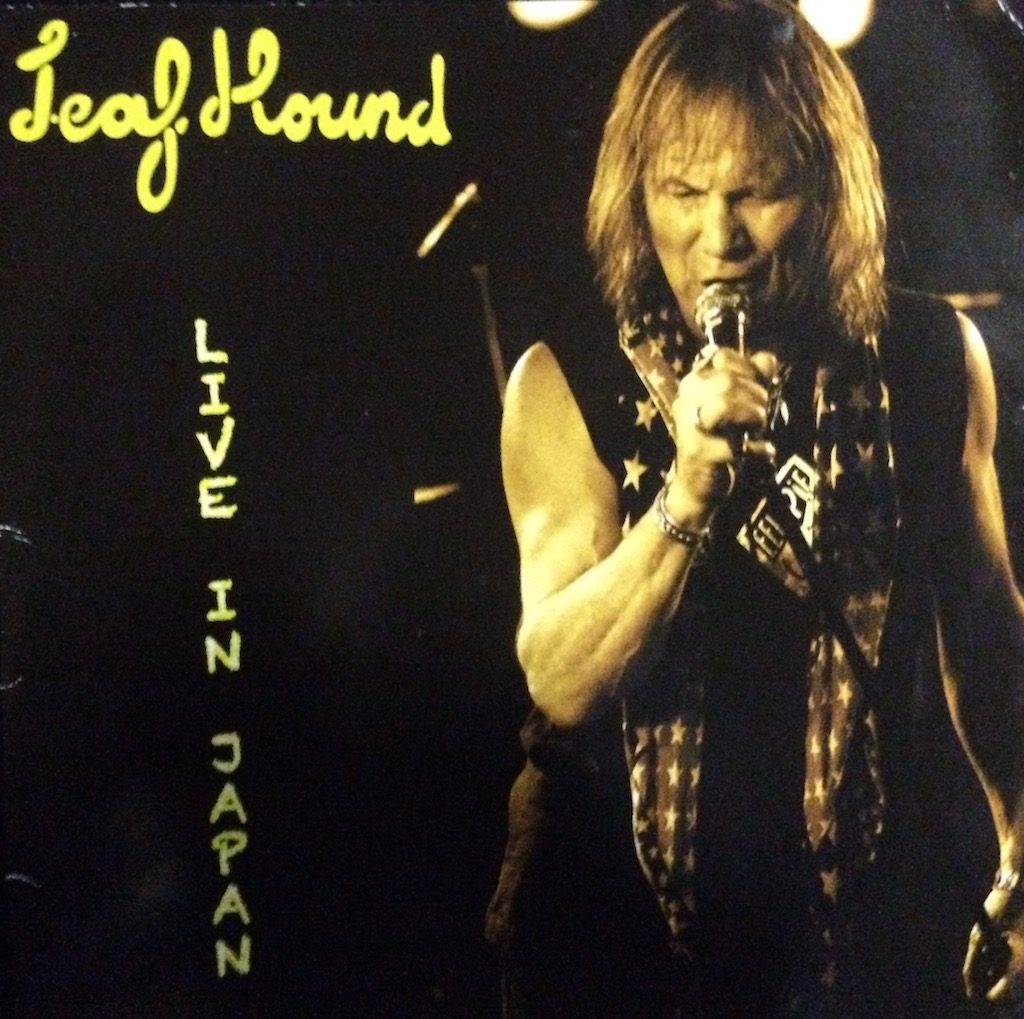
The Live in Japan Album is due for re-release on DVD, CD and later on vinyl by Repertoire Records, with an expected release date March 2019.
I also had last year a re-release of my original solo album, Peter French “Ducks In Flight” by Repertoire Records.
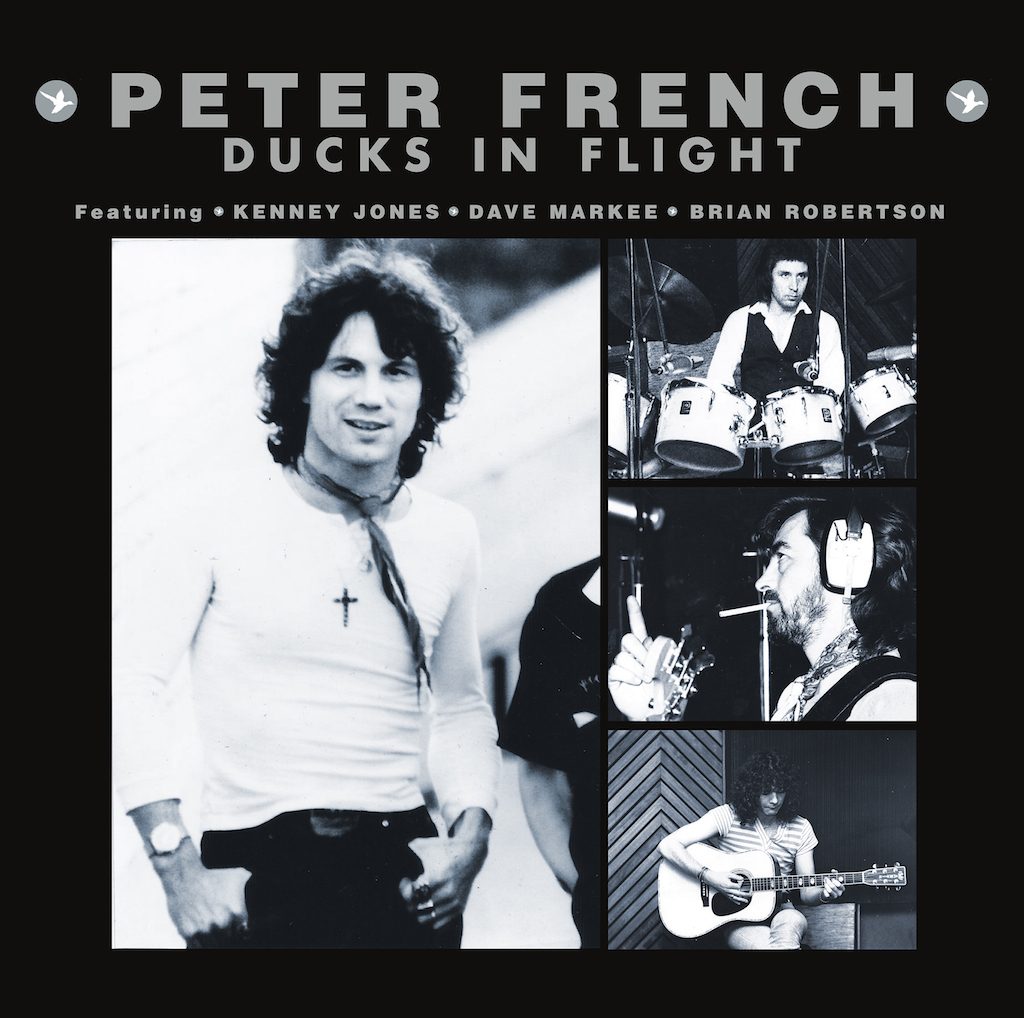
TVP: Are there any seminal figures from the late ‘60s and early ‘70s that you can look back on today and say were an important, if under recognized, influence on the shape of the music from the era?
PF: Wow, there were so many fantastic acts about during this time, among them, obviously, WHO, CREAM, FACES, ZEPPELIN, HUMBLE PIE. One lesser known great band was called Detective.
TVP: And what are you doing these days?
Just over a year ago, I was asked to reform Atomic Rooster with Steve Bolton, so Atomic Rooster are once more back on the road again, we have already played Italy, Norway, Poland, last year, andthis year will be playing Hungary, Italy, Belgium, Germany, do check out Rooster’s new website, www.atomicroostermusic.com
I am also delighted to be doing a few more shows this year with my special band Leaf Hound as well.
TVP:Peter, out of curiosity- do you have an original UK pressing of Leaf Hound?
PF: Ha, ha, I have only one copy of the original Album, if I had known that it would have been worth so much I would have bought my own albums.
A Few Notes on Pressings:
I’m reluctant to encourage anyone to pay the tariff for a UK Decca pressing of Leaf Hound, Growers of Mushroom. If you own a copy and paid reasonable money for it, consider yourself lucky. There is the German self-titled album on Telefunken that omits the title track and one other, “Freelance Fiend,” with different cover art but includes a poster. It sells for a fraction of the price original UK Decca today. There are also reissues of both of these albums, including a curiosity from 1978 on Discwasher Records of the German album; curious because although Discwasher, best known for that ubiquitous wood handled record cleaning brush from the ‘70s, did have a label with some light jazz and a few classical entries, Leaf Hound seemed entirely out of place in its catalog. I spoke to Bruce Maier, the maestro behind Discwasher and he told me that the Leaf Hound record was not part of the original Discwasher catalog. How it got there in some listings will remain a mystery unless an astute reader can enlighten us.
The Repertoire reissue is a known quantity, and its products are decent, legitimate and priced reasonably, with more than adequate jackets and artwork. Virtually all of that label’s recent output comes from digital files. There is a CD from See for Miles that was purportedly mastered from the tapes. It isn’t bad. If I do land a German copy of the album in self-titled form, I’ll report. In the meantime….
I want to thank Peter French, not only for his time and insight, but also for his music over the years. He’s been an important figure in this mix of blues-rock and hard rock bands that shaped the sound as we know it today––Peter never enjoyed the fame of a Robert Plant (few did) but has been a constant as a lead singer, songwriter and performer for more than 50 years. We owe him a debt of gratitude for his contributions to the development of a body of music that several generations of listeners and fans continue to enjoy. And sometimes, when I hear somebody comment about some new hard rock band channeling Zep, I have to refrain from asking “have you ever heard Leaf Hound?”
Bill Hart
Austin, TX
February, 2019
Leave a Reply
You must be logged in to post a comment.